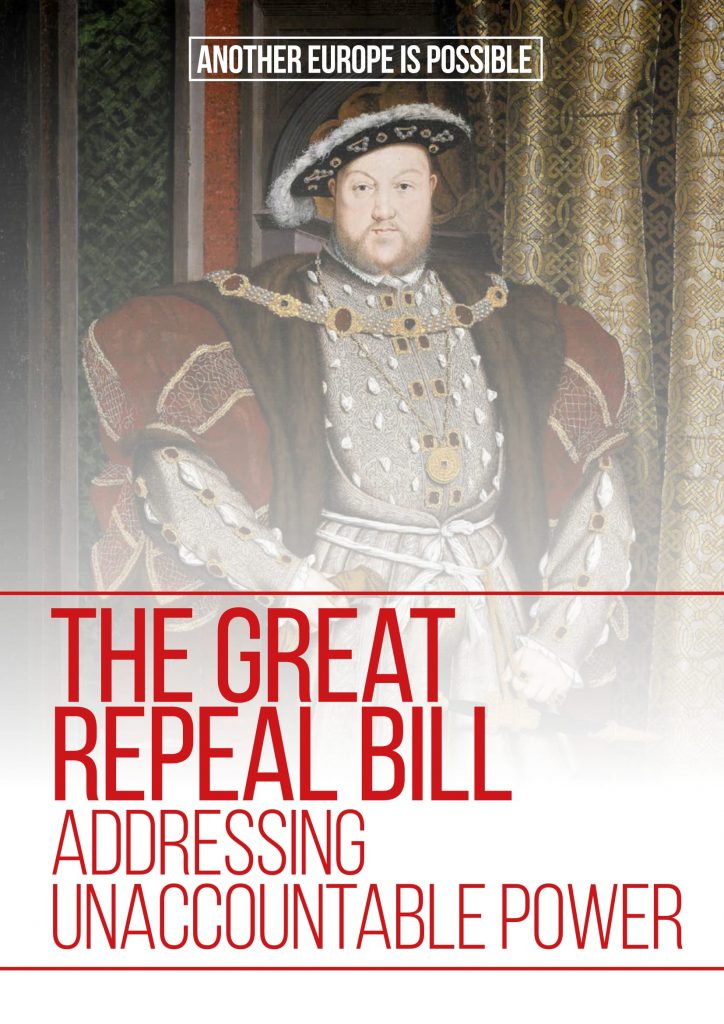 The Great Repeal Bill is the next major battleground in the fight to oppose a catastrophic hard Brexit. But there is little understanding of what the bill entails or the accountability gaps that threaten our democratic processes.
The Great Repeal Bill is the next major battleground in the fight to oppose a catastrophic hard Brexit. But there is little understanding of what the bill entails or the accountability gaps that threaten our democratic processes.
To address this we are pleased to announce the publication of The Great Repeal Bill; Addressing Unaccountable Power, a new briefing note to inform politicians, trade unionists, campaigners, NGOs, and the general public of how the Bill threatens our democracy.
DOWNLOAD THE BRIEFING NOTE IN FULL
The author, the legal academic Sam Fowles, is available for interview and comment. Please email info@anothereurope.org.
EXECUTIVE SUMMARY
The Great Repeal Bill (“the Bill” or “GRB”) has the potential to grant the government an almost unprecedented level of unaccountable power. The Bill will grant exceptional legal powers. The political process by which it is passed will chill democratic scrutiny. Progressives must address the Bill’s accountability gaps if campaigns on substantive issues, such as free movement, the environment, and employment rights, are to be successful.
Accountability gaps
The Bill, as proposed, creates four “accountability gaps”. These maximise the discretionary powers of government while, at the same time, minimising opportunities for scrutiny of those powers.
1. The absence of transparency about the contents of the Bill means that no proper public debate can take place about the substance of the Bill. Important questions that remain unanswered include:
a. What EU law will be preserved by the Bill?
b. In which class of UK law will EU norms be preserved by the Bill?
c. How will these decisions be made?
2. The discretionary powers contained in the Bill will give the government the power to repeal rights contained in EU law with minimal scrutiny and without the permission of Parliament. Moreover, it is not clear that the most extreme powers mooted for inclusion in the Bill are necessary to achieve its stated purpose.
3. Sunset clauses must be included in the Bill. Without them, the government will be able to exercise vastly expanded discretionary power indefinitely. This process may permanently alter the balance of power between Parliament and the government.
4. The political process by which the Bill will be passed is likely to strangle debate by withholding details of the Bill until the last minute then rushing the Bill through Parliament with the threat of a “regulatory cliff” if the Bill is not passed before Brexit day.
Recommendations
In view of these challenges four recommendations are suggested:
1. The government must reveal specific details of the content of its Great Repeal Bill, and it must be a clear and detailed Bill (not a ‘skeleton bill’)
2. This must happen very soon, with a clear proposed timetable to ensure proper time necessary for the task with a minimum 6 months for consultation and 6 months for debate
3. The transfer of EU law into UK law must be transparent, clear and accountable:
• It must include provisions to ensure that delegated power to the government is clearly and precisely defined in scope and purpose.
• Henry VIII powers should be avoided, and when used, subject to the super-affirmative procedure.
• Sunset clauses should be used to ensure that the delegated legislative powers do not last indefinitely.
• There must be enhanced processes and resources for screening and scrutinising delegated legislation, including through new or existing parliamentary committees.
4. The government must guarantee, on the face of the Bill, clear explicit provisions to prevent the Bill affecting human rights, equalities, or environmental laws and standards, and to prohibit the use of delegated legislation to change or undermine such laws and standards.
27th March 2017
